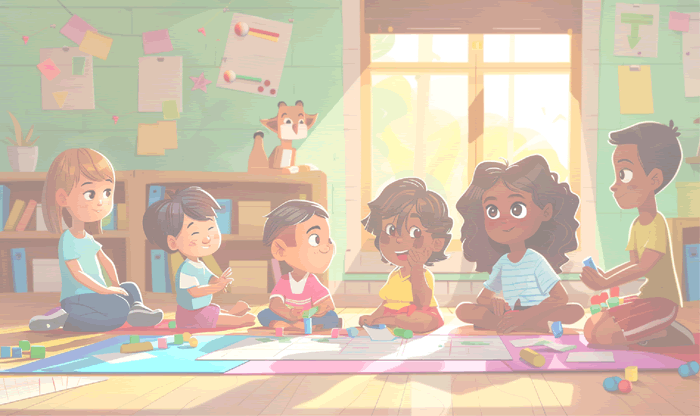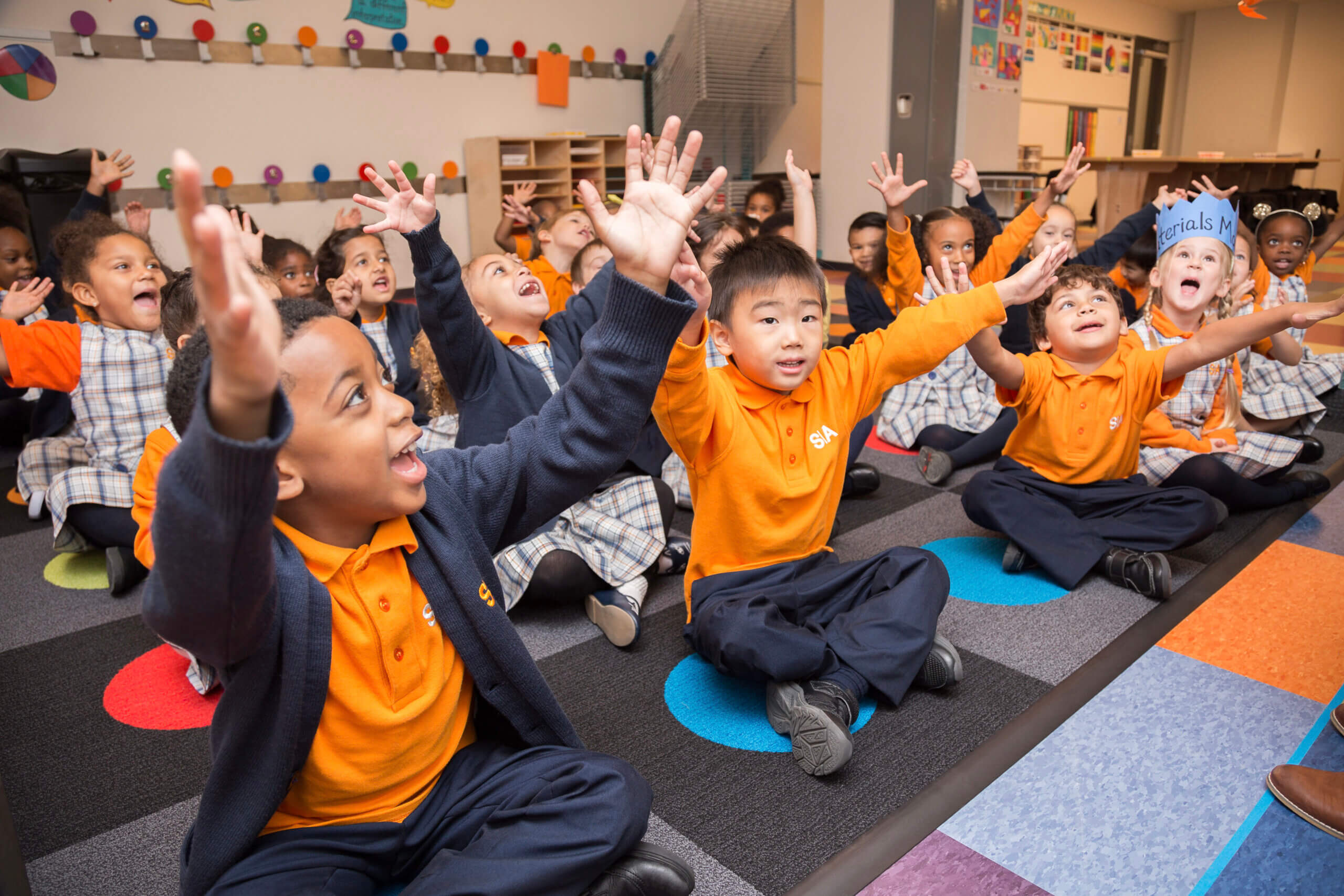Innovative storytelling workshops that inspire students in Private School
Wiki Article
The Value of Interactive Tasks in Grade College Education
Interactive activities play an essential function in quality college education and learning. They engage trainees and enhance learning results. Via group projects and hands-on experiments, trainees experience the material in a functional means. This technique accommodates diverse learning styles and advertises necessary abilities. The advantages expand beyond academics. Checking out the much deeper influence of these tasks reveals their significance fit young learners' futures. What transformations occur when students actively participate?Enhancing Engagement Through Interactive Learning
Traditional mentor techniques have their merits, interactive learning greatly enhances pupil interaction in quality institution education. This technique motivates active participation, enabling trainees to immerse themselves in the learning process. By making use of group tasks, hands-on experiments, and technology-driven resources, instructors produce an atmosphere where trainees feel much more attached to the product.Interactive understanding promotes cooperation among peers, promoting interaction skills and team effort. It additionally provides to varied learning designs, ensuring that aesthetic, auditory, and kinesthetic learners can all flourish. Additionally, students are most likely to preserve info when they actively take part, instead of passively receiving understanding.
This dynamic method not only makes finding out delightful but likewise imparts a sense of possession in pupils regarding their academic trip. As they engage with the material, their inquisitiveness and inspiration to discover rise, laying a solid foundation for future academic success.
Establishing Vital Thinking Skills
Interactive knowing not just boosts interaction however additionally acts as a catalyst for creating important believing abilities in grade college trainees. With activities such as problem-based learning, arguments, and hands-on experiments, students are encouraged to examine details, evaluate different perspectives, and create reasoned verdicts. These interactive experiences need pupils to wonder about presumptions, leading them to think more deeply regarding numerous topics.
Interactive activities typically present real-world situations that challenge trainees to use their understanding creatively. By navigating through these difficulties, they discover to identify appropriate information and make informed choices. This process promotes not only individual important thinking however also urges students to articulate their believed procedures, enhancing their ability to interact efficiently. Consequently, interactive understanding settings grow a generation of vital thinkers who are much better prepared to tackle complicated issues in their future academic and professional undertakings.
Promoting Cooperation Amongst Peers
Fostering partnership amongst peers is important in elementary school education and learning, as it improves team effort and communication skills. Taking part in team tasks aids pupils build depend on and regard for each other, preparing for reliable cooperation. Analytical with each other enables pupils to discover from each various other and establish a cumulative approach to obstacles.Teamwork and Interaction Abilities
Effective synergy and communication abilities are crucial elements of an effective quality school education. Participating in interactive activities encourages students to collaborate, share ideas, and address troubles together. Such experiences advertise the advancement of crucial interaction capacities, allowing kids to share their ideas plainly and pay attention proactively to others. Via team effort, students discover to appreciate varied viewpoints, promoting a sense of neighborhood and shared responsibility. Structured group tasks, whether in academics or innovative tasks, boost peer interactions, showing kids just how to discuss duties and resolve conflicts. These skills not just add to a positive class environment yet additionally prepare students for future collective undertakings in higher education and the office. In general, teamwork and communication are foundational to alternative development in elementary school.Structure Trust Fund and Respect
Building depend on and respect among peers acts as a cornerstone for successful partnership in quality school environments. When students really feel valued and valued by their schoolmates, they are more probable to engage actively in group activities. Interactive tasks, such as team projects and cooperative video games, give opportunities for trainees to pick up from one another, cultivating a sense of community. This environment encourages open interaction, permitting students to express their ideas and point of views without concern of judgment. As trust develops, students become more ready to share duties and support each other's discovering. Ultimately, growing an atmosphere of trust and respect boosts not just academic results but also social growth, furnishing trainees with essential social skills for their future endeavors.Problem-Solving With each other
Collective analytical involves students in essential thinking and synergy, crucial abilities for their scholastic and personal growth. When trainees collaborate to deal with challenges, they discover to communicate properly, respect diverse point of views, and utilize each other's staminas. This procedure boosts their capacity to analyze troubles from different angles and create creative remedies. Team tasks, such as scientific research experiments or math challenges, advertise active participation and promote a sense of community. As pupils work together, they likewise build social abilities, learning to work out and endanger, which are essential for future interactions. Ultimately, analytical together cultivates a helpful discovering environment, empowering pupils to take ownership of their education while preparing them for joint undertakings past the classroom.Motivating Creative Thinking and Technology
Urging imagination and technology in quality school education and learning can be considerably improved through hands-on understanding experiences. These activities allow pupils to engage directly with principles and products, fostering creative reasoning. In addition, collective team tasks can stimulate diverse concepts and services, additionally nurturing an imaginative setting.Hands-On Understanding Knowledge
A multitude of hands-on learning experiences considerably improves creativity and development in elementary school education and learning. Engaging trainees in functional tasks permits them to use theoretical knowledge in real-world contexts, link fostering deeper understanding. By manipulating tools and products, children establish critical analytical abilities and find out to think outside the box. These experiences inspire interest and motivate trainees to explore their interests additionally. In addition, hands-on activities can connect numerous topics, connecting scientific research, art, and mathematics in significant methods. This interdisciplinary method urges trainees to see connections and think artistically. Inevitably, hands-on learning experiences nurture a generation of pioneers, furnishing them with the skills and self-confidence required to take on future challenges and contribute to culture in special means.Collaborative Team Projects
Hands-on learning experiences normally lead to the incorporation of collective group projects, which play an essential role in cultivating imagination and advancement in quality school education. These projects encourage pupils to collaborate, sharing ideas and point of views, which boosts analytical abilities and important thinking. Via collaboration, pupils find out to interact effectively and respect diverse viewpoints, essential skills for their future. Additionally, group projects provide possibilities for students to try out different roles, raising their adaptability and confidence. Engaging in this participating setting allows them to explore their imagination, pushing the boundaries of conventional knowing. Eventually, collaborative group projects not just enhance the educational experience yet additionally prepare pupils for real-world difficulties that call for synergy and cutting-edge thinking.Structure Self-confidence and Self-reliance
As pupils participate in interactive tasks, they commonly find opportunities to construct self-confidence and freedom. These tasks, whether they include hands-on tasks, role-playing, or analytical jobs, motivate pupils to take effort link and reveal their ideas honestly. By taking part in such experiences, pupils find out to trust their capabilities and choose without counting only on guidance from peers or educators.In addition, interactive tasks cultivate a feeling of possession over knowing. They develop important thinking skills and resilience when students tackle challenges collaboratively or separately. This procedure not just enhances their understanding of the subject matter yet also equips them to take threats in their learning trip.
As they navigate numerous interactive scenarios, trainees gradually lost their insecurity, paving the way for boosted self-worth - Private School. Ultimately, these tasks play an essential duty in nurturing positive and independent learners, equipped to face future academic go to my blog and individual obstacles
Developing a Favorable Classroom Environment
While promoting a favorable classroom setting is important for efficient learning, it needs deliberate effort from educators to produce a space where students really feel secure, reputable, and involved. A favorable atmosphere encourages collaboration, enabling pupils to reveal themselves without fear of judgment.Educators can attain this by establishing clear assumptions, advertising common regard, and recognizing specific contributions. Incorporating interactive activities additionally improves interaction, making discovering more enjoyable and vibrant.
Furthermore, a nurturing setting sustains social-emotional advancement, as trainees learn to browse partnerships and fix problems. Educators play a vital function in modeling positive behavior and enhancing a society of compassion and inclusivity.
Often Asked Inquiries

Just How Can Parents Support Interactive Discovering in the house?
Parents can sustain interactive learning at home by providing engaging materials, urging hands-on tasks, incorporating instructional games, promoting discussions, and creating a nurturing atmosphere that advertises interest and expedition in their children's learning experiences. (Private School)What Kinds of Interactive Tasks Are Many Effective?
Hands-on tasks, collective video games, role-playing situations, and instructional innovation applications are amongst one of the most efficient interactive activities. These engage pupils, improve vital assuming skills, and advertise teamwork, inevitably promoting a much deeper understanding of various topics.Exactly How Do Interactive Tasks Deal With Different Understanding Styles?
Interactive activities engage aesthetic, acoustic, and kinesthetic learners by integrating diverse approaches. These tasks help with comprehending through hands-on experiences, joint discussions, and visual aids, allowing pupils to absorb information according to their recommended learning style.What Are the Costs Connected With Carrying Out Interactive Activities?

Carrying out interactive activities sustains costs such as materials, training for instructors, innovation upgrades, and potential facility alterations. Spending plan constraints can also influence the frequency and variety of activities used to pupils in educational setups.
How Can Teachers Evaluate the Effect of Interactive Learning?
Teachers can evaluate the effect of interactive learning through monitorings, student feedback, efficiency metrics, and comparative evaluation of examination scores prior to and after implementation, making certain a complete understanding of involvement and expertise retention enhancements.Through activities such as problem-based learning, debates, and hands-on experiments, pupils are motivated to examine info, review different point of views, and formulate reasoned final thoughts. Interactive activities usually present real-world scenarios that challenge students to use their understanding creatively. Engaging in interactive activities motivates students to work together, share concepts, and fix issues with each other. Interactive activities, such as team tasks and cooperative video games, provide possibilities for trainees to find out from one an additional, cultivating a feeling of community. As trainees involve in interactive tasks, they typically find chances to construct confidence and freedom.
Report this wiki page